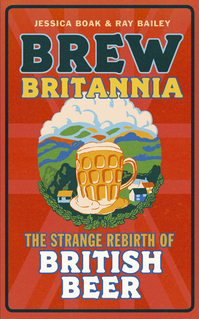Hail the ale: vivid history of beer's rebirth
Added: Wednesday, June 18th 2014


Brew Britannia: the Strange Rebirth of British Beer, Jessica Boak & Ray Bailey (Aurum Press, £12.99)
Boak and Bailey are veteran bloggers, greatly knowledgeable about all things beer, and they’ve now moved from the Twittersphere to the printed page. This is an exhilarating read, well researched, in the main objective, and encompassing the views of many important players in the great beer revival of the past 40 years.
It begins, naturally, with a big bang: the astonishing revelation that when Christopher Hutt, who went on to become the second national chairman of CAMRA and wrote the seminal Death of the English Pub in the1970s, arrived as a student in Norwich in 1965 only one pub in a city packed with boozers sold cask beer. The Watney’s Red Revolution was in full swing: the London brewery had bought all three Norwich breweries, eventually closed them, and packed their outlets with ghastly keg beer.
Just how deep and wide the beer revolution has been can seen in the fact that Norwich pubs are now awash with beer from more than 30 breweries in Norfolk alone. Nature abhors a vacuum: you can’t keep good beer down. Chris Hutt has been interviewed extensively by the authors and his experience and thoughtful insights, as a real ale campaigner and specialist pub owner, inform the book and enrich the story.
The scope is impressive. The book covers the very earliest days when the Society for the Preservation of Beers from the Wood (SPBW) put its collective head above the bar top and criticised the decline of proper beer and the role of the new national brewers, through to the current beer scene, vibrant, buoyant and offering a diversity of choice and styles undreamt of by the pioneers of 40-plus years ago. In short, the book encompasses both CAMRA and BrewDog, which makes the authors objectivity necessary, impressive and, given lingering animosities, brave.
There is if anything rather too much about the SPBW, which was never an influential organisation. To demand beer from wooden casks during the Swinging Sixties was intrepid if a little bizarre. The Campaign for Real Ale was a beer of a different colour and the authors pay homage to the zeal of the founding members, their determination to face the keg brewers head on, using their journalistic skills to grab a frenzy of media coverage for their cause.
A substantial section of the book covers the early days of the campaign and its impact -- channelled through beer festivals -- on the brewing industry. Handpumped beer was no longer consigned to the dump bin of history. Slowly, a new and invigorating “micro-brewing” movement was under way, while older family and regional brewers could feel it was worth their while to carry on making traditional beer. Watneys Red and Double Diamond no longer ruled supreme.
My only fault with the coverage of CAMRA is that authors have accepted as true some of the views of the campaign’s detractors in the 1970s and 80s, one of whom fed Private Eye with a series of defamatory fantasies about alleged rows and even punch-ups among the leading members. One involved founding member Michael Hardman and myself. Private Eye reported that we had come to blows at the Alexandra Palace Great British Beer Festival as a result of Hardman pinching my girl friend’s bum. The lady in question probably wouldn’t have minded but it just didn’t happen.
Boak and Bailey say such stories were not only damaging but also “bred paranoia at CAMRA’s head office”. Far from suffering from distress, the staff at HQ basked in the glory of a succession of beer festivals at Ally Pally that were packed to the gunwales with an ever-increasing range of beer. While the authors seriously over-play disputes and rows within CAMRA, they are right to point to occasional outbreaks of silliness, such as the dispute in the late 1970s over “air pressure dispense” – the Scottish system for serving cask beer. It was quickly and amicably settled.
For the record, Michael Hardman didn’t “resign from CAMRA in 1977”. He left its full-time employment and he remains a fully paid-up and passionate member. I was never CAMRA’s press officer, but that’s a minor matter.
From CAMRA, Boak and Bailey move on to cover the arrival, growth, teething problems but final important influence of SIBA. The Small Independent Brewers Assocation, as the very name suggests, did have humble beginnings but as the Society of Independent Brewers today it’s mightily influential. It speaks loudly and with great clarity to government. Its greatest achievement has clearly been the introduction early this century of Progressive Beer Duty that led to the explosion of new craft brewers.
The book deals in depth with the astonishing upheaval in recent years that has seen beer move on from pints of mild and bitter to the great profusion of styles now available. The authors have interviewed and analysed the role of Kelham Island, Thornbridge, Meantime, BrewDog and others, who have thrown wide the frontiers of fermented grain and hops. The new pioneers dare to be different. They add fruits, herbs, chocolate, honey and whisky to their brews to reach out the widest possible audience. And in some cases they challenge CAMRA orthodoxy by moving away from cask beer and produce modern versions of keg, filtered but not necessarily pasteurised and with low gas content.
Which brings us to the thorny matter of craft beer. What is it? Does anyone have a definition? And who is to blame for starting this prickly ball rolling?
Boak and Bailey have the answer. “When a slew of articles about exciting developments in American brewing began to appear in Britain in the early 1990s, it became clear that ‘craft’ had won the writers’ vote. Ed Vulliamy wrote for the Observer about US ‘craft ale’ in 1994. Roger Protz, also by this time a frequent visitor to the US, followed him in 1995 by applying the term to British brewing in a round-up of Manchester’s ‘independent craft breweries’...When a new national society for home brewers launched in 1995, it was called the Craft Brewing Association, as founder member James McCrorie recalled: ‘I wanted something that didn’t include the term “home-brewing” – it had come to mean, in Britain, “a can of crap and a kilo of sugar”. I’d never heard the term “craft beer”...Since then, it’s taken off thanks to sloppy journalism, and because people like Roger Protz started using it’.”
So it was me, folks. Mea culpa, maxima culpa.








